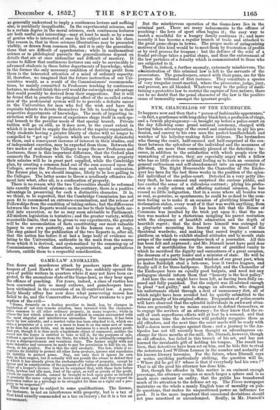GAME-JAW ANOMALIES.
THE - fierce and murderous attack by poachers upon the game- keepers of Lord Hawke at Womersley, has suddenly opened the eyes of public writers in quarters where it may not have been ex- pected, to the anomalous state of the Game-laws, as they bear upon the offence of poaching. For years, indeed, a class of rustics has been converted into so many outlaws, and gamekeepers have been victimized in the execution of an ill-contrived law. A pecu- liarly bloody affray has now done what persevering reason has failed to do, and the Conservative Morning Post awakens to a per- ception of the evil— "Game, formerly on a footing peculiar to itself, has, by changes in legislation of not very remote creation, been invested with the character- istics common to all other ordinary property, in many respects ; while in others the law which relates to it is stall suffered to remain surrounded with the most singular and mischievous anomalies. For instance, it has been made by law saleable, and a market value has been attached to it, which en- ables a proprietor of a cover or a moor to lease it on the same sort of terms as he does his arable fields, and in many instances to a much greater profit. And yet, though it is thus made a legitimate object of commerce, neither the owner nor the lessee is entitled to take or kill it, for the purposes of sale, Without a special licence from the State, for which he is arbitrarily compelled to pay a disproportionate and vexatious duty. The farmer might with not more injustice and unreason be made to pay for permission to kill his or, his sheep, or his poultry. Nor is this the only anomaly. The law, while it re- cognizes its liability to protect all other farm-produce, ignores and repudiates its liability to protect game. Nay, not only does it ignore its own duty in that respect, but it actually will not permit the owner to defend that to which it has already Oven the exchangeable value of property, except by tayour and in consideration of the payment of a further annual tribute in the shape of a keeper's licence. Can we be surprised that, with these facts before tImm, lawless and idle men, fond of the sport, as well as greedy of the profit, which its capture affords, cannot be brought to look upon game as included in precisely the !tame category as horses and oxen and that they regard its Possession rather as a privilege to be struggled for than as a right and a pro- perty to be respected ? "
This view may be subject to some qualifications. The licence, for instance, is not an interference with property, but is a tax of that kind usually commended as a tax onluxury ; for it is a tax on amusement. But the mischievous operation of the Game-laws lies in the criminal part. There are many inducements to the offence of poaching : the love of sport often begins it; the easy way to snatch a mouthful for a hungry family continues it; and more recently it has become a regular 'branch of trade and attached to the great game-shops in towns. The proper mode of antagonizing motives of this kind would be to meet them by frustration of profits or by civil process for trespass : but the defence of the relic of a feudal privilege takes a partial shape, and thus the enforcement of the law partakes of a ferocity which is communicated to those who are subjected to it. There is, indeed, a further anomaly, extremely mischievous. The administration of this criminal law is left to the servants of the prosecutors. The gamekeepers, armed with their guns, are for this purpose the tribunal of first instance. They constitute a species of very irregular court-martial, where the prosecutor, judge, jury, and provost, are all blended. Whatever may be the policy of main- taining a protective law to restrict the capture of fern nature?, there can be no doubt that the penal character of the law is the positive cause of immorality amongst the ignorant people.


































 Previous page
Previous page